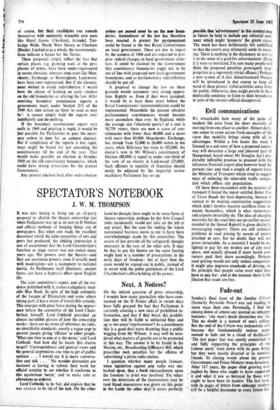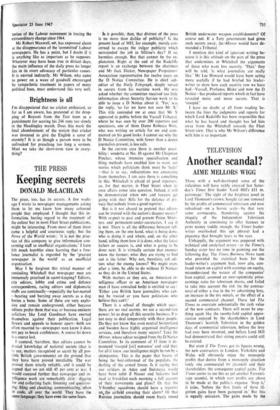SPECTATOR'S NOTEBOOK
J. W. M. THOMPSON
It was nice timing to bring out an all-party proposal to abolish the theatre censorship just when Parliament was up to its ears in D Notices and official methods of keeping things out of newspapers. But when one reads the excellent document which the joint committee of MPS and peers has produced, the abiding impression is one of amazement that the Lord Chamberlain's function as stage censor was not ended many years ago. His powers over the theatre—and they are enormous powers, even if usually used with moderation—are a monument to national inertia. As Parliament itself illustrates, ancient forms can have a hypnotic effect upon English life.
The joint committee's report, and all the evi- dence published with it, makes a singularly read- able Blue Book. In spite of the high solemnity of the League of Dramatists and some others taking part, it has a strain of irresistible comedy. This emerges with great force during the appear- ance before the committee of the Lord Cham- berlain himself. Lord Cobbold provided an almost incredible picture of how the censorship works : there are no terms of reference, no rules, no identifiable standards, merely a vague urge to prevent people giving 'offence' to other people. 'What one tries to aim at is the norm,' said Lord Cobbold. And how did he locate this elusive target? 'Correspondence and general views and the general impressions one tries to get of public opinion . . . I would say it is more conversa- tion and talk . . . ' No wonder dramatists are incensed at having to submit their work for official scrutiny to see whether it conforms to this mysterious 'norm,' and to make cuts or alterations as ordered.
Lord Cobbold, to be fair, did explain that he was anxious to be rid of the task. On the other
hand he thought there ought to be some form of theatre censorship, perhaps by the Arts Council (who incidentally would not take on the job at any price). But the case for ending the whole nonsensical business seems to me to have been overwhelmingly made by this committee. The courts of law provide all the safeguards thought necessary in the case of the other arts. It may be that to put the theatre on the same footing might lead to a number of prosecutions in the early days of freedom: but at least then the cases would be argued out in public, instead of in secret with the polite gentlemen of the Lord Chamberlain's office holding all the power.
Next, A Notices?
On the related question of press censorship, I wonder how many journalists who have com- mented on the D Notice affair in recent days have fully grasped the fact that Parliament is currently creating a new class of prohibited in- formation, and that if they break this prohibi- tion they will be liable to unlimited fines and up to two years' imprisonment? As a punishment this is a good deal more daunting than a public wigging from Mr Wilson: it may well be won- dered what matters of gravity are to be protected in this way. The answer is to be found in the Marine, etc., Broadcasting (Offences) Bill, which prescribes such penalties for the offence of 'advertising' a pirate radio station.
I question whether many people foresaw, when legislation against pop radio was em- barked upon, that a fresh encroachment upon the freedom to print was involved. Yet what- ever the intentions of the Government may be (and bland reassurance was given on this point in the Lords the other day) it seems perfectly possible that 'advertisement' in this context may in future be held to include any editorial com- ment which might 'promote' the pirate cause. The word has been deliberately left undefined so that the courts may ultimately settle its mean- ing. There is nothing in the dictionary to restrict it to the sense of a paid-for advertisement. (Even if it were so restricted, I'm sure many people will think the proposed penalties grotesquely inap- propriate to a supremely trivial offence.) Perhaps a new system of A (for Advertisement) Notices will be introduced in due course to keep all word of these pirates' sinful activities away from the public. Otherwise, they might persist in their deplorable tendency to listen to their broadcasts in spite of the sternest official disapproval.
Evil communications
It's remarkable how many of the pains of modern life arise from the sheer necessity of moving from one place to another. Almost daily, one seems to come across fresh examples of the curse that mobility brings along with all its advantages. Within a few hours this week I listened to a sad story of how a proposed motor- way will devastate a large and pleasant part of Hampstead; heard about Mr Douglas Jay's pre- dictably inflexible promise to proceed with the infamous Stansted airport plan however loud the protests rise; and read a couple of reports from the Ministry of Transport which tried to suggest ways of reducing the miserable traffic conges- tion which afflicts city populations.
Of these three encounters with the miseries of transport I found the report entitled Better Use of Town Roads the least depressing, because it seemed to be making constructive suggestions which didn't involve massive sacrifices from in- nocent bystanders, which is what motorways and airports invariably do. The idea of charging motorists for the road they use (as earlier recom- mended in the Smeed Report) is given distinctly encouraging support. There are still technical problems in road pricing by means of meters attached to cars, but no doubt they will not prove intractable. As a motorist I would be de- lighted to pay for my modest use of city road space, and equally pleased if more lavish con- sumers paid their share accordingly. Perhaps road pricing would not only reduce congestion.
It might also improve standards of driving, on the principle that people value most what they have to pay for : and at She moment there is the illusion that roads are free.
Fade-out
Sunday's final issue of the Sunday Citizen (formerly Reynolds News) was sad reading in more ways than one. Personally, I find the closing down of almost any journal an unhappy business: 'any man's death diminishes me,' etc. This no doubt is a hazard of one's calling. But the end of the Citizen was melancholy also because this fundamentally serious paper seemed to fade out in a cloud of disillusion. 'The last paper that was openly committed to and fully supporting the principles of the Labour party' went down with its guns firing. but they were mostly directed at its nominal friends. Its closing words about the present Government and Prime Minister were ferocious. After 117 years, the paper died grieving over neglect by those who ought to have supported it and what it saw as betrayal by those who ought to have been its leaders. The last issue, with its pages of letters from unhappy readers, will be a helpful document to some future his-
torian of the Labour movement in tracing the extraordinary change since 1964.
Mr Robert Maxwell, MP, has expressed alarm at the disappearance of the 'committed' Labour newspapers. He has a point, but I doubt if it is anything like as important as he supposes. Whatever may have been true in distant days, the main influence of the daily press no longer lies in its overt advocacy of particular causes. It is exerted indirectly. Mr Wilson, who came to power on a wave of goodwill encouraged by sympathetic treatment in papers of many political hues, must understand this very well.
Brightness is all
I'm disappointed that no cricket enthusiast, so far as I am aware, has protested at the drop- ping of Boycott from the Test team as a punishment for scoring his 246 runs too slowly in the Headingley match. Does this mark the final abandonment of the notion that cricket was invented to gife the English a sense of eternity? It is as though a parson were to be unfrocked for preaching too long a sermon. Must we take the short-term view in every- thing?































 Previous page
Previous page